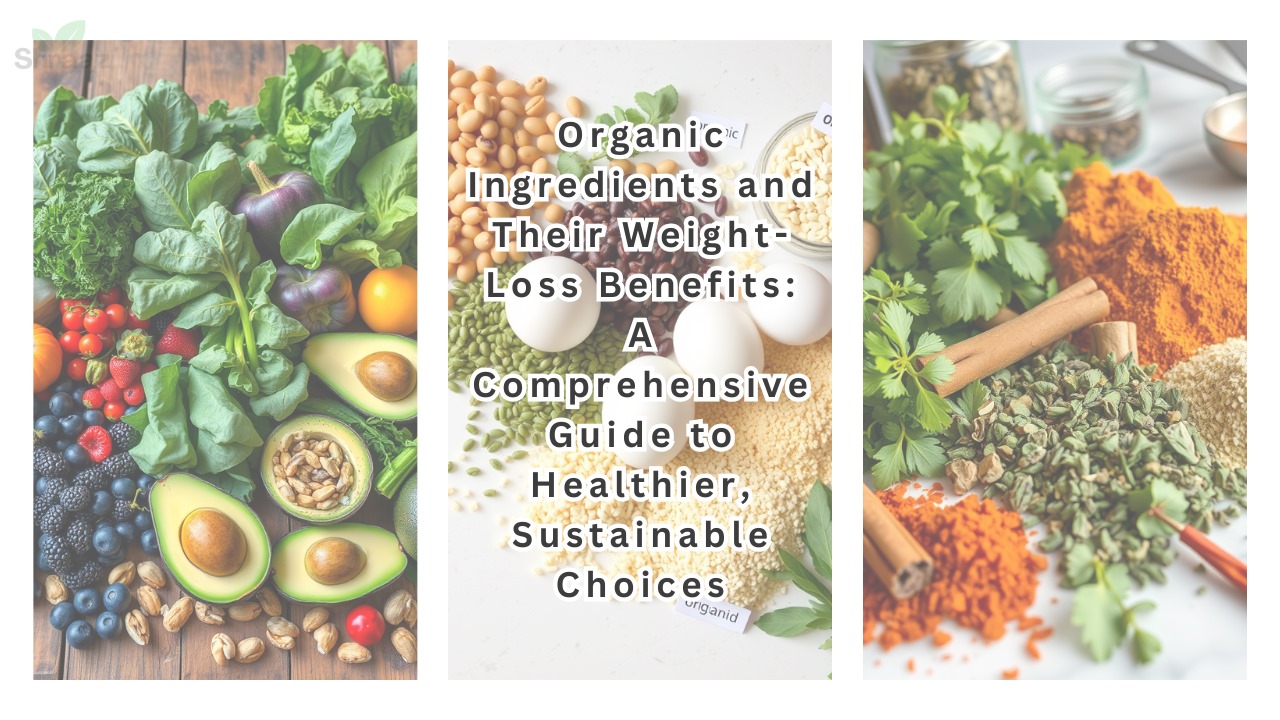Introduction: The Role of Organic Ingredients in Weight Loss
The journey toward weight loss is complex, involving not only diet and exercise but also the quality and source of the food consumed. Increasingly, organic ingredients are becoming a favored choice for those pursuing weight loss, not only because they’re perceived as healthier but also because they may offer unique benefits for effective and sustainable weight management.
Organic ingredients are produced without synthetic pesticides, GMOs, or artificial additives, often resulting in cleaner, more nutrient-dense foods. Higher concentrations of vitamins, minerals, and antioxidants provide not only the basic caloric needs but also a range of micronutrients that can support metabolism, enhance satiety, and positively affect hormone levels. Additionally, organic foods are less likely to contain hormone-disrupting chemicals, which have been linked to weight gain. This introduction delves into why organic foods are particularly beneficial for weight loss, laying the groundwork for a closer look at the specific benefits throughout the article.
What Makes Food “Organic”?
The term “organic” refers to food production that adheres to strict guidelines set by regulatory bodies, such as the USDA or EU Organic certification. Organic farming practices avoid synthetic pesticides, herbicides, genetically modified organisms (GMOs), and artificial preservatives. This results in foods that are often more environmentally friendly, free from harmful additives, and—importantly—nutrient-dense.
Key Differences Between Organic and Conventional Foods in Weight Loss
While calorie control is central to weight loss, the quality of calories matters. Here are some primary differences between organic and conventional foods and their implications for weight management:
| Aspect | Organic | Conventional |
| Pesticides | Free from synthetic pesticides | Often contains pesticide residues |
| Nutrient Density | Higher in antioxidants, vitamins, and minerals | May have lower levels of some nutrients |
| Hormone Disruptors | Minimal exposure to endocrine-disrupting chemicals | Potential exposure to hormone-disrupting pesticides |
| Environmental Impact | Lower environmental footprint | Typically, there is greater impact on soil and water health |
These factors contribute to why organic ingredients may support healthier, long-term weight loss in ways conventional foods might not.
Nutrient Density and Satiety in Organic Foods
One of the central benefits of organic foods is their nutrient density. Nutrient-dense foods provide a high level of vitamins, minerals, and antioxidants with fewer calories, making them an ideal choice for weight loss. By selecting organic foods that are packed with nutrients, individuals pursuing weight loss may benefit from improved satiety, reduced cravings, and healthier overall metabolism.
1. Higher Nutrient Content in Organic Foods
Research shows that organic produce often contains higher levels of certain nutrients compared to conventional produce. A 2014 meta-analysis published in the British Journal of Nutrition found that organic crops contain up to 69% more antioxidants than conventionally grown crops. Additionally, organic produce has been shown to have higher levels of vitamins C, E, and certain carotenoids, which are essential in reducing oxidative stress and supporting immune health.
Table: Comparison of Nutrients in Organic vs. Conventional Foods
| Nutrient | Organic Foods | Conventional Foods |
| Antioxidants | 19-69% higher | Lower due to conventional practices |
| Vitamin C | Higher concentration | Lower concentration |
| Minerals | Often higher (e.g., iron, magnesium) | Lower mineral content |
| Pesticide Residues | Minimal to none | Likely to have residues |
This increase in antioxidants and essential vitamins allows organic foods to support health and metabolism, which is critical for sustainable weight loss. Antioxidants, in particular, may help combat inflammation, which can be linked to weight gain, especially around the abdomen.
2. Satiety Benefits of Nutrient-Rich Foods
Nutrient-dense organic foods not only offer higher levels of vitamins and minerals, but they also contribute to a greater feeling of fullness, known as satiety. This is particularly beneficial for weight loss, as satiety can reduce overeating and the urge for snacks between meals.
Organic foods, such as leafy greens, berries, and root vegetables, are rich in fiber, which helps slow digestion and stabilize blood sugar levels. This results in:
- Reduced Hunger Hormone Secretion: Higher-fiber foods help reduce the release of ghrelin, the hormone that stimulates hunger.
- Increased Satisfaction After Meals: Organic whole foods with high fiber levels increase the feeling of fullness, which may prevent overeating.
- Steady Blood Sugar Levels: Nutrient-dense foods slow glucose absorption, helping prevent blood sugar spikes and subsequent cravings.
For example, organic apples provide fiber, vitamins, and phytonutrients, making them an excellent choice for a satisfying, low-calorie snack that aids in weight management.
Organic Foods That Boost Satiety
Here’s a list of organic foods known for their ability to increase satiety and assist in weight management:
- Leafy Greens: Kale, spinach, and arugula are packed with fiber and vitamins and have a high water content that increases satiety.
- Whole Grains: Organic oats, quinoa, and brown rice are high in fiber, promoting longer digestion times and blood sugar stability.
- Berries: Organic blueberries, raspberries, and blackberries are nutrient-rich with fiber and antioxidants that reduce hunger.
- Nuts and Seeds: Organic almonds, chia seeds, and flaxseeds provide healthy fats and protein that make them satiating snacks.
Hormone-Friendly Benefits of Organic Ingredients
Hormones play a crucial role in regulating body weight, metabolism, appetite, and energy balance. Certain chemicals found in conventional foods—especially pesticides and synthetic additives—can disrupt hormonal balance and potentially contribute to weight gain. Organic ingredients, by contrast, are produced without synthetic chemicals and often contain compounds that support healthy hormone levels, creating an environment that is more conducive to weight management.
1. Hormone-Disrupting Chemicals in Conventional Foods
Many synthetic pesticides and additives in conventional foods contain endocrine-disrupting chemicals (EDCs), which can interfere with hormonal function. EDCs, such as bisphenol A (BPA), phthalates, and certain pesticides, are associated with weight gain and metabolic issues. They may contribute to:
- Increased Fat Storage: EDCs can alter fat cell development, encouraging the body to store more fat.
- Insulin Resistance: Some chemicals may interfere with insulin, leading to increased blood sugar levels and a higher risk of weight gain.
- Appetite Dysregulation: EDCs may interfere with leptin and ghrelin, hormones that regulate hunger and fullness.
A 2019 study published in Environmental Research found a connection between higher levels of EDCs in the body and increased rates of obesity and metabolic disorders. By choosing organic foods, which are free from synthetic pesticides and other harmful chemicals, individuals may reduce their exposure to these disruptive compounds.
2. Organic Foods and Hormonal Health
Choosing organic foods can reduce exposure to EDCs and support hormonal balance. Organic ingredients, particularly certain vegetables, and whole foods, contain compounds that promote healthy hormone levels. Here are some hormone-supporting organic foods:
Cruciferous Vegetables
Organic cruciferous vegetables, such as kale, broccoli, and Brussels sprouts, contain indole-3-carbinol (I3C), a compound that supports estrogen metabolism and may help in reducing excess estrogen levels. This is particularly beneficial for individuals with estrogen-dominant body types, as excess estrogen has been linked to fat storage, especially in the abdomen.
Omega-3-Rich Foods
Organic sources of omega-3 fatty acids, such as walnuts, flaxseeds, and chia seeds, support hormone production and reduce inflammation. Omega-3s are also linked to improved leptin sensitivity, which can help regulate appetite.
Organic Herbs and Adaptogens
Certain organic herbs, such as maca root and ashwagandha, act as adaptogens, supporting the body’s response to stress. Elevated stress levels can increase cortisol production, a hormone linked to belly fat. By incorporating these hormone-balancing foods, individuals can manage cortisol levels and reduce stress-related weight gain.
Table: Organic Foods and Their Hormonal Benefits
| Organic Food | Hormonal Benefit |
| Kale, Broccoli | Supports estrogen metabolism |
| Walnuts, Flaxseeds | High in omega-3s, supports leptin sensitivity |
| Maca Root, Ashwagandha | Reduces cortisol levels, aids stress management |
| Berries | Rich in antioxidants, may reduce inflammation linked to hormones |
Choosing organic foods that actively support hormonal health is a key strategy in natural weight management. By fostering balanced hormone levels, organic foods create a body environment that can better regulate appetite, fat storage, and energy levels.
Organic Superfoods with Proven Weight Loss Benefits
Organic superfoods are nutrient-dense foods that provide an array of vitamins, minerals, antioxidants, and other beneficial compounds. Certain organic superfoods, in particular, have properties that aid in weight loss by promoting satiety, boosting metabolism, and supporting overall health. Choosing organic versions of these superfoods can maximize these benefits by avoiding pesticides and other potentially harmful additives.
1. Organic Avocado
Avocados are rich in monounsaturated fats, which have been shown to promote satiety and reduce the likelihood of overeating. According to a study published in Nutrition Journal, adding half an avocado to lunch can increase feelings of fullness by up to 26%, helping reduce the desire to snack later in the day.
- Nutritional Profile (per 100g of organic avocado):
- Calories: 160
- Healthy Fats: ~15g
- Fiber: 7g
- Vitamins: Vitamin K, Vitamin E, Vitamin C
- Weight-Loss Benefits: Promotes satiety, stabilizes blood sugar, and provides essential healthy fats that can help with weight management.
2. Organic Apple Cider Vinegar (ACV)
Organic ACV has been a popular remedy for weight loss due to its acetic acid content, which has been shown to reduce fat storage and promote fat burning. Studies suggest that ACV can help reduce body weight, BMI, and belly fat when consumed regularly.
- Suggested Use: Mix 1-2 tablespoons of organic ACV in water before meals.
- Weight-Loss Benefits: ACV may reduce appetite, help manage blood sugar levels, and reduce fat accumulation.
Table: Effects of ACV on Weight-Loss Indicators
| Indicator | Results |
| Body Weight | Reduction in overall weight after 12 weeks |
| Belly Fat | Decrease in abdominal fat |
| BMI | Reduction in BMI |
3. Organic Chia Seeds
Chia seeds are known for their high fiber and omega-3 fatty acid content, both of which play roles in weight management. They absorb water and expand in the stomach, helping to increase fullness and reduce calorie intake.
- Nutritional Profile (per 28g of organic chia seeds):
- Calories: 137
- Fiber: 10g
- Omega-3 Fatty Acids: 5g
- Weight-Loss Benefits: High fiber content helps reduce hunger and stabilize blood sugar levels.
4. Organic Turmeric
Turmeric contains curcumin, a compound with anti-inflammatory and antioxidant properties. Chronic inflammation can lead to weight gain, especially around the abdomen, so reducing inflammation may help in weight management.
- Weight-Loss Benefits: Curcumin in turmeric has been associated with reductions in body fat, especially around the abdomen.
- Suggested Use: Add organic turmeric to teas, smoothies, or savory dishes to enhance the flavor and boost nutrient intake.
5. Organic Green Tea
Organic green tea contains catechins, which are antioxidants that may promote fat oxidation. Studies show that the catechin called EGCG (epigallocatechin gallate) in green tea can increase metabolic rate and promote fat burning.
- Weight-Loss Benefits: Studies suggest green tea can help reduce body weight and fat mass, especially when consumed as part of a low-calorie diet.
- Suggested Use: Drink 1-2 cups of organic green tea daily for optimal results.
Organic Proteins for Lean Muscle and Metabolism Support
Organic protein sources are essential for preserving lean muscle during weight loss. Consuming protein helps maintain muscle mass, which is important for sustaining metabolism. Organic proteins also come without the antibiotics, hormones, and synthetic additives often found in conventional sources.
1. Importance of Lean Organic Protein in Weight Loss
Protein has a high thermic effect of food (TEF), which means the body burns more calories digesting protein than it does with fats or carbs. Organic protein sources support weight loss by increasing metabolism, preserving lean body mass, and reducing hunger.
- Thermic Effect of Protein: Up to 30% of protein calories are burned through digestion and processing.
- Hunger Regulation: Protein increases levels of peptide YY, a hormone that promotes satiety and reduces hunger.
2. Best Organic Protein Sources
Organic Lean Meats
Organic, grass-fed beef and free-range chicken are excellent sources of protein. These proteins support muscle repair and growth without the synthetic hormones found in conventional meat products.
- Organic Grass-Fed Beef:
- Protein: 26g per 100g
- Contains essential amino acids for muscle support
- Free-Range Organic Chicken:
- Protein: 31g per 100g
- Low in fat and rich in B vitamins
Plant-Based Proteins
Organic lentils, chickpeas, and quinoa are high-quality plant-based protein sources. They are also rich in fiber, which aids digestion and satiety, making them ideal for weight management.
- Lentils: High in protein (18g per cup) and fiber.
- Quinoa: Contains all nine essential amino acids and provides 8g of protein per cup.
Organic Ingredients for Gut Health and Weight Loss
Gut health is increasingly recognized as a key factor in weight loss, influencing metabolism, appetite, and overall energy levels. Organic foods, particularly those rich in fiber and probiotics, can support a healthy gut microbiome.
1. The Gut Microbiome and Its Role in Weight Loss
The gut microbiome consists of trillions of bacteria that influence digestion, immunity, and metabolism. Certain bacteria can help with the regulation of body weight and appetite, making a balanced gut essential for effective weight loss.
Table: How Gut Health Impacts Weight Loss
| Aspect of Gut Health | Impact on Weight Loss |
| Microbiome Diversity | A diverse microbiome is linked to a leaner body |
| Inflammation Reduction | Low inflammation supports better weight control |
| Metabolism Regulation | Balanced bacteria help maintain metabolism |
2. Organic Foods for Gut Health
Organic Prebiotic-Rich Foods
Prebiotics feed the beneficial bacteria in the gut, helping to maintain a balanced microbiome. Common prebiotic foods include:
- Garlic: Contains inulin, a prebiotic fiber that supports gut bacteria.
- Onions: Rich in prebiotic fibers that enhance digestive health.
- Asparagus: High in fiber and promotes the growth of healthy bacteria.
Organic Probiotic-Rich Foods
Probiotics introduce live beneficial bacteria to the gut. Fermented organic foods are natural sources of probiotics, aiding in digestion and potentially reducing bloating, which can contribute to feeling slimmer and lighter.
- Sauerkraut: Fermented cabbage that provides beneficial bacteria.
- Kimchi: A spicy fermented vegetable dish rich in probiotics and fiber.
- Organic Yogurt: Contains live bacteria cultures that help maintain gut health.
These organic prebiotic and probiotic foods support the microbiome, which can facilitate weight management by improving digestion, reducing inflammation, and enhancing metabolism.
Avoiding Toxins and Additives that Hinder Weight Loss
One of the key benefits of choosing organic foods for weight loss is the avoidance of harmful toxins and additives commonly found in conventionally grown and processed foods. Synthetic pesticides, preservatives, and artificial flavorings can interfere with the body’s hormonal balance, metabolism, and digestive health, potentially contributing to weight gain and making weight loss more challenging.
1. Toxins and Additives Commonly Found in Conventional Foods
Non-organic foods are often treated with synthetic chemicals and additives to improve shelf life, appearance, and pest resistance. These additives include pesticides, preservatives, and flavor enhancers that may impact weight and health negatively. Below are some common toxins found in conventional foods and their potential effects on weight management:
Table: Common Additives in Conventional Foods and Their Effects
| Additive/Toxin | Potential Effect on Weight | Example Foods |
| Pesticides | Linked to weight gain, hormonal disruption | Non-organic fruits, vegetables |
| Artificial Sweeteners | May increase cravings, and impact insulin response | Diet sodas, low-calorie snacks |
| Preservatives | Potentially linked to digestive issues and bloating | Processed meats, canned goods |
| MSG (Monosodium Glutamate) | May increase appetite and caloric intake | Packaged snacks, processed foods |
| BPA (Bisphenol-A) | Associated with fat storage and metabolic changes | Canned foods, plastic-packaged items |
2. How Toxins Interfere with Weight Loss
The body’s endocrine system, responsible for hormone regulation, can be disrupted by chemicals in processed and conventionally grown foods. Endocrine-disrupting chemicals (EDCs) such as BPA and phthalates can lead to:
- Increased Fat Storage: EDCs have been shown to alter fat cell development, promoting greater fat accumulation.
- Insulin Resistance: Chemicals like BPA can interfere with insulin function, making it harder to manage blood sugar and weight.
- Appetite Dysregulation: MSG and artificial sweeteners may interfere with appetite-controlling hormones, potentially leading to overeating.
A study published in Environmental Health Perspectives found that people with higher BPA levels in their bodies had a 50% higher chance of being obese. By choosing organic, individuals reduce their exposure to such toxins, supporting hormonal balance and metabolic health.
3. Benefits of Choosing Organic to Avoid Toxins
Opting for organic foods eliminates exposure to many of these toxins and additives, which can help the body naturally regulate its weight. Organic foods, especially when minimally processed, also avoid synthetic preservatives and flavor enhancers, which may lead to:
- Improved Digestive Health: Avoiding additives like preservatives can reduce digestive issues and bloating.
- Better Blood Sugar Control: With no artificial sweeteners or flavor enhancers, organic foods promote steady blood sugar, reducing cravings.
- Hormonal Health Support: Without EDCs, organic foods help support balanced hormone levels, which is crucial for weight management.
Organic Herbs and Spices to Boost Weight Loss
Incorporating organic herbs and spices into a diet can provide a natural and effective way to support weight loss. Many of these ingredients are rich in antioxidants, anti-inflammatory compounds, and unique phytochemicals that can aid in metabolism, appetite control, and fat burning. Organic options are especially valuable here, as they avoid pesticide contamination and offer higher concentrations of active compounds.
1. Organic Herbs and Spices with Weight-Loss Benefits
Organic Turmeric
Turmeric contains curcumin, a compound known for its powerful anti-inflammatory and antioxidant properties. Chronic inflammation can contribute to weight gain, especially around the abdomen, and reducing inflammation can support weight loss.
- Weight-Loss Benefit: Curcumin in turmeric can reduce fat tissue growth, support fat oxidation, and aid in metabolism.
- Suggested Use: Add turmeric to smoothies, curries, and teas for an added health boost.
Organic Cinnamon
Cinnamon has been shown to help regulate blood sugar levels, which is essential for reducing cravings and managing weight. It contains polyphenols that may improve insulin sensitivity.
- Weight-Loss Benefit: Organic cinnamon helps stabilize blood sugar, potentially reducing appetite and cravings.
- Suggested Use: Sprinkle on oatmeal, or yogurt, or add to coffee for a flavorful and health-promoting touch.
Organic Ginger
Ginger has thermogenic properties, meaning it can raise body temperature slightly, which may increase metabolism. It also contains compounds that improve digestion and reduce bloating.
- Weight-Loss Benefit: Ginger’s thermogenic effect may increase calorie burning, while its digestive benefits reduce bloating.
- Suggested Use: Use fresh ginger in tea, stir-fries, or smoothies.
2. Benefits of Choosing Organic Herbs and Spices
Organic herbs and spices are free from synthetic pesticides and may contain higher levels of the active compounds that provide health benefits. Some benefits of choosing organic varieties include:
- Higher Nutrient Content: Organic herbs and spices may have higher concentrations of antioxidants.
- Avoidance of Pesticide Residues: Non-organic herbs can carry pesticide residues that may be harmful in the long run.
- Enhanced Flavor: Many organic spices have a stronger flavor, meaning less is needed for the same effect, which can help in managing caloric intake.
Table: Key Organic Herbs and Spices for Weight Loss
| Herb/Spice | Active Compound | Weight-Loss Benefit | Suggested Use |
| Turmeric | Curcumin | Reduces inflammation, supports fat oxidation | Curries, teas, smoothies |
| Cinnamon | Polyphenols | Stabilizes blood sugar, reduces cravings | Oatmeal, yogurt, coffee |
| Ginger | Gingerol | Thermogenic effect aids digestion | Tea, stir-fries, smoothies |
| Cayenne Pepper | Capsaicin | Boosts metabolism, promotes fat-burning | Soups, salads, protein dishes |
Sustainable and Ethical Aspects of Choosing Organic for Weight Loss
Opting for organic foods not only supports personal health and weight loss goals but also has broader environmental and ethical benefits. Organic farming practices promote soil health, reduce pollution, and support biodiversity. By choosing organic foods, individuals can contribute to a sustainable food system while also consuming nutrient-dense, clean ingredients that support weight loss.
1. Environmental Benefits of Organic Foods
Organic farming methods avoid the use of synthetic pesticides and fertilizers, which have been linked to soil degradation, water pollution, and loss of biodiversity. The benefits of organic farming for the environment include:
- Soil Health: Organic farming practices like crop rotation and composting enhance soil structure and nutrient content, promoting more productive and sustainable agriculture.
- Water Conservation: Organic farms are less likely to pollute nearby water sources with pesticides and chemical runoff.
- Biodiversity Preservation: Organic farms provide habitats for pollinators and other wildlife, helping to maintain balanced ecosystems.
Comparison Table: Conventional vs. Organic Farming Impact
| Aspect | Conventional Farming | Organic Farming |
| Soil Health | Degrades soil quality | Enhances soil with composting practices |
| Water Pollution | Potentially high due to runoff | Low risk due to natural fertilizers |
| Biodiversity | Can harm wildlife | Supports diverse ecosystems |
2. Ethical Considerations
Organic farming practices often prioritize animal welfare and worker safety, aligning with ethical considerations for many consumers. Organic certification standards ensure that animals are raised in more humane conditions and that farm workers are not exposed to harmful chemicals.
- Animal Welfare: Organic standards typically require better living conditions for livestock, such as access to outdoor spaces and prohibition of growth hormones.
- Worker Safety: Farmworkers on organic farms face fewer health risks related to chemical exposure.
3. Choosing Organic for Sustainable Weight Loss
The decision to choose organic foods aligns personal health goals with environmental and ethical values, creating a positive impact beyond individual weight loss. By supporting sustainable farming practices, organic consumers contribute to a healthier planet and a more responsible food system.
Benefits for Personal Health and Sustainability
- Cleaner Ingredients: Organic foods reduce exposure to toxins, aiding in better health and potentially making weight loss easier.
- Supporting Ethical Practices: By purchasing organic products, consumers can support humane and environmentally friendly farming.
- Contributing to a Healthy Food System: Organic foods are part of a sustainable food cycle, promoting a long-term solution to feeding a growing global population.
Conclusion: A Sustainable Approach to Weight Loss with Organic Ingredients
Incorporating organic ingredients into a weight loss plan offers far-reaching benefits that extend beyond just the pursuit of a slimmer body. Organic foods not only provide nutrient-dense options that support metabolism, satiety, and fat-burning, but they also promote overall health by avoiding the harmful toxins and additives commonly found in non-organic foods.
Choosing organic can optimize weight loss efforts by supporting gut health, reducing inflammation, and ensuring that the foods you consume are free from potentially harmful chemicals like pesticides, preservatives, and artificial additives. Additionally, organic superfoods, proteins, and herbs provide a wealth of antioxidants, fiber, and healthy fats, all of which are essential for effective weight management.
Key Benefits of Organic Ingredients for Weight Loss:
- Nutrient Density: Organic foods are often richer in vitamins, minerals, and antioxidants that promote overall health, boost metabolism, and help regulate appetite.
- Hormonal Balance: Organic ingredients are free from harmful endocrine-disrupting chemicals, helping to maintain a healthy hormonal environment that supports weight loss.
- Reduced Toxin Exposure: By choosing organic, you avoid pesticides, synthetic fertilizers, and other additives that can interfere with metabolism, digestion, and fat storage.
- Gut Health: Organic prebiotic and probiotic-rich foods support a healthy microbiome, improving digestion and reducing bloating, both of which contribute to a leaner, healthier body.
- Sustainability: Organic farming practices promote environmental sustainability, enhance soil health, and support biodiversity, making organic choices beneficial for both personal health and the planet.
Taking a Holistic Approach to Weight Loss
The combination of organic ingredients for weight loss—whether through superfoods, lean proteins, herbs, or gut-health-promoting foods—provides a holistic approach that addresses both physical and environmental health. Organic food consumption helps reduce inflammation, manage blood sugar, and maintain a healthy metabolism, all of which are crucial factors in long-term weight management.
By shifting to an organic diet, you’re not only investing in your personal well-being but also contributing to the preservation of the environment and ethical farming practices. As research continues to uncover the numerous benefits of organic foods, it becomes clear that organic ingredients are a powerful and sustainable choice for anyone seeking effective, long-term weight loss solutions.
Final Thoughts:
Adopting a diet rich in organic foods supports both immediate and long-term health benefits, making it an ideal strategy for weight loss. The key to lasting success lies not just in calorie reduction but in nourishing the body with clean, nutrient-dense foods that enhance metabolism, regulate hormones, and improve digestion. In choosing organic, you’re opting for a path to wellness that is both sustainable and effective, empowering you to achieve your weight loss goals in a way that also benefits the planet.




